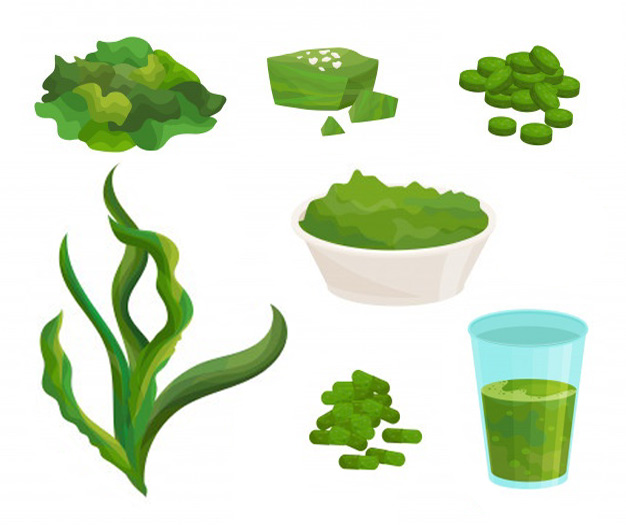Kelp is a brown leafy edible seaweed that grows along colder coastlines. Though it is typically thought to be a plant, technically speaking it is not. It does not contain more than one clearly differentiated tissue—making it, instead, a heterokont.
Kelp has been an essential component of East Asian diets for over a thousand years. Certain types of kelp are even prescribed as therapeutics in Traditional Chinese Medicine (TCM).
TCM uses include treatment of enlarged thyroid glands, swelling, cysts, liver problems, tumors and phlegm. In the 18th century, when kelp’s iodine content was discovered, conventional medicine used it to treat goiter—an enlarged thyroid—typically caused by iodine deficiency in the diet.
Kelp is an excellent source of iodine, potassium, magnesium, iron and calcium—all of which support the immune system in their own right. However, kelp also contains many other compounds, such as fucoidan, which provide anti-viral and anti-inflammatory benefits.
Supporting research
THYROID HEALTH
Thyroid hormones play essential roles in both the innate and adaptive immune responses, and kelp supports thyroid health with its high iodine content.
In a study conducted at Sapporo Medical University in Sapporo, Japan, kelp improved thyroid function of patients with severe motor and intellectual disabilities and hypothyroidism due to iodine deficiency. When patients were given powdered kelp daily their thyroid function was restored, increasing the concentration of iodine in the urine. The study was published in Clinical Pediatric Endocrinology in October 2011.
In another thyroid study, conducted in the U.S., kelp increased levels of thyrotropin—the hormone that stimulates the thyroid gland. The study was published in Endocrine Practice in October 2003.
FUCOIDAN BENEFITS
Another nutritional benefit of kelp comes from fucoidan—which is extracted from the cell walls of kelp. Research published in 2015 found fucoidan had a variety of immune-modulation effects, such as promoting natural killer cells, and enhancing anti-viral and anti-tumor responses.
The researchers, which included scientists from the U.S., China and Japan, concluded that fucoidan “can be potentially useful as a therapeutic agent for infectious diseases.” The study was published in Marine Drugs in March 2015.
A 2017 Chinese study revealed that an extract of fucoidan from kelp blocked influenza infection in vitro. Scientists reported that fucoidan was able to inactivate virus particles before infection as well as some stages after adsorption.
The researchers reported that fucoidan was able to “prolong the survival time of virus-infected mice, and presented an ability to significantly improve the quality of immune organs, immune cell phagocytosis and humoral immunity.” The study was published in Scientific Reports in January 2017.
COVID-FIGHTING POTENTIAL
A review of existing studies on kelp conducted in India in 2020 concluded that kelp extracts held the potential to serve as a natural therapeutic for fighting viral infections, including the current pandemic.
“Based on the present literature we strongly believe that algal metabolites may open new avenues to the development of novel therapeutic modalities not only for COVID‐19, but also for the other viral infections prevailing the globe,” the researchers wrote in their summary.
All studies cited in the review can be seen at PubMed’s Wiley Public Health Emergency Collection here.]
Optimal Health Systems products containing kelp/iodine include:
• Exposure Protection Pak
• Opti-Iodine
• Opti-Thyroid
• Natural Z Pak
– – –
Sources: Links included within article.


